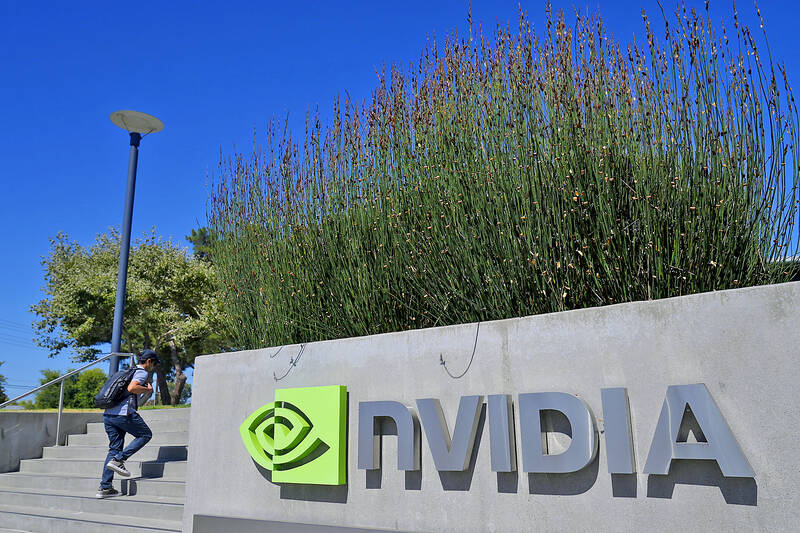Nvidia Corp is set to unveil investment plans for Thailand, joining Alphabet Inc and Microsoft Corp, as Southeast Asia becomes a hot spot for building artificial intelligence (AI) data centers and manufacturing the components that power them.
The US chip designing firm would announce investments during chief executive officer Jensen Huang’s (黃仁勳) trip to Bangkok in December, Thai Minister of Commerce Pichai Naripthaphan said on Monday.
He declined to give details on the investment or how much the company would bring into Thailand.

Photo: AP
The investment by Nvidia could lead to more funding “with related clusters following suit,” Pichai said.
Clinching Nvidia as an investor in Thailand would be a shot in the arm for Southeast Asia’s second-largest economy that has been vying with its neighbors to attract investments from tech giants. Thailand has bagged multibillion dollar investments over the past few years from Amazon.com Inc, Google and Microsoft to build data centers and other cloud infrastructure.
A spokesperson for Nvidia did not reply to an e-mailed request for comment.
The Santa Clara, California-based company has pledged investments in building AI infrastructure in Indonesia and Malaysia, and is exploring opportunities in Vietnam.
Nvidia’s chips are manufactured by Taiwan Semiconductor Manufacturing Co (台積電) and its AI servers are built mostly by Taiwanese assemblers.
A longtime manufacturing powerhouse for vehicles and electronics, Thailand is playing catch-up with Malaysia and Singapore. It wants to bolster growth from an average of less than 2 percent under a decade of military-backed rule.
Interest from Nvidia, other tech companies, and those in the supply chain should boost investment applications back to levels before a 2014 coup and help Thailand regain “lost opportunities” in that decade, Pichai said.
“The outlook for the Thai economy is bright and this is only the beginning,” said the veteran politician, who was appointed to the job last month in the administration of the Thai Prime Minister Paetongtarn Shinawatra.
There is already a surge in foreign investment pledges in Thailand this year, especially into the data centers and printed circuit board manufacturing. Official data showed investment pledges jumped 42 percent to 722.5 billion baht (US$21.6 billion) in the first nine months of this year from a year ago.
Pichai said new investment proposals, including from domestic companies, might reach as much as 1 trillion baht this year.

SEMICONDUCTORS: The German laser and plasma generator company will expand its local services as its specialized offerings support Taiwan’s semiconductor industries Trumpf SE + Co KG, a global leader in supplying laser technology and plasma generators used in chip production, is expanding its investments in Taiwan in an effort to deeply integrate into the global semiconductor supply chain in the pursuit of growth. The company, headquartered in Ditzingen, Germany, has invested significantly in a newly inaugurated regional technical center for plasma generators in Taoyuan, its latest expansion in Taiwan after being engaged in various industries for more than 25 years. The center, the first of its kind Trumpf built outside Germany, aims to serve customers from Taiwan, Japan, Southeast Asia and South Korea,

Gasoline and diesel prices at domestic fuel stations are to fall NT$0.2 per liter this week, down for a second consecutive week, CPC Corp, Taiwan (台灣中油) and Formosa Petrochemical Corp (台塑石化) announced yesterday. Effective today, gasoline prices at CPC and Formosa stations are to drop to NT$26.4, NT$27.9 and NT$29.9 per liter for 92, 95 and 98-octane unleaded gasoline respectively, the companies said in separate statements. The price of premium diesel is to fall to NT$24.8 per liter at CPC stations and NT$24.6 at Formosa pumps, they said. The price adjustments came even as international crude oil prices rose last week, as traders

Taiwan Semiconductor Manufacturing Co (TSMC, 台積電), which supplies advanced chips to Nvidia Corp and Apple Inc, yesterday reported NT$1.046 trillion (US$33.1 billion) in revenue for last quarter, driven by constantly strong demand for artificial intelligence (AI) chips, falling in the upper end of its forecast. Based on TSMC’s financial guidance, revenue would expand about 22 percent sequentially to the range from US$32.2 billion to US$33.4 billion during the final quarter of 2024, it told investors in October last year. Last year in total, revenue jumped 31.61 percent to NT$3.81 trillion, compared with NT$2.89 trillion generated in the year before, according to

SIZE MATTERS: TSMC started phasing out 8-inch wafer production last year, while Samsung is more aggressively retiring 8-inch capacity, TrendForce said Chipmakers are expected to raise prices of 8-inch wafers by up to 20 percent this year on concern over supply constraints as major contract chipmakers Taiwan Semiconductor Manufacturing Co (TSMC, 台積電) and Samsung Electronics Co gradually retire less advanced wafer capacity, TrendForce Corp (集邦科技) said yesterday. It is the first significant across-the-board price hike since a global semiconductor correction in 2023, the Taipei-based market researcher said in a report. Global 8-inch wafer capacity slid 0.3 percent year-on-year last year, although 8-inch wafer prices still hovered at relatively stable levels throughout the year, TrendForce said. The downward trend is expected to continue this year,